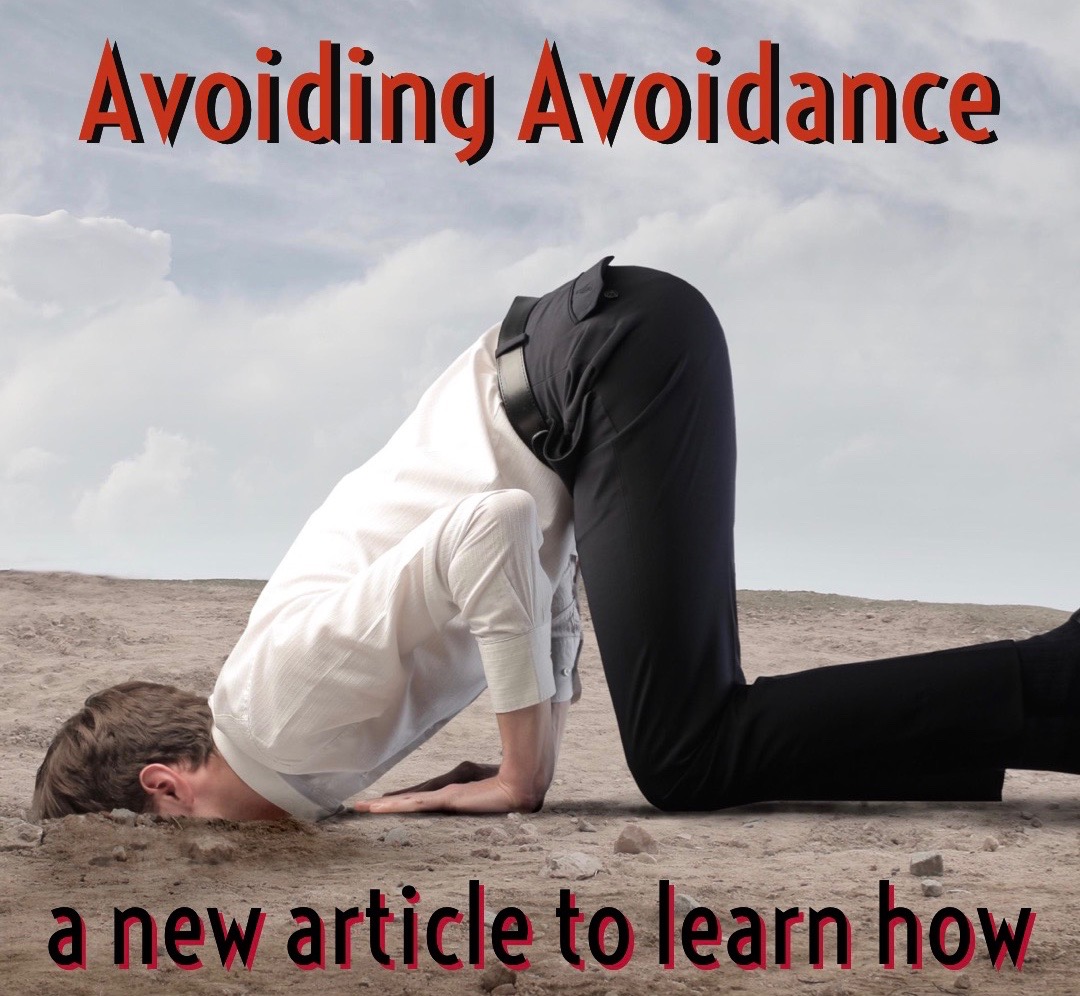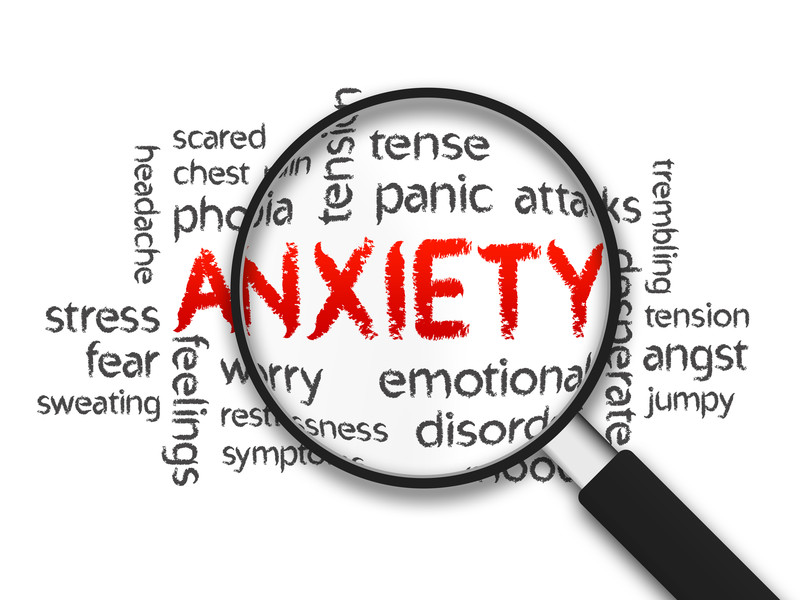We all know this feeling very well. There’s something important we have to do. It often literally needs to get done, but we don’t do it. We put it off—and find increasingly creative ways to rationalize avoiding what’s necessary. It happens all the time: preparing that presentation for work, writing that 12-page term paper for class, having that awkward conversation about boundaries with your in-laws, asking for that raise you deserve. We even avoid asking for help when we know we need it the most.
Procrastination is the common way to describe this behavior, and while it sums up the idea of avoidance nicely, personally I’m not a fan. I think the term “procrastination” has grown heavily stigmatized in our culture, conjuring images of lazy, indulgent, apathetic, unambitious people. In my opinion this couldn’t be farther from the truth. While those prone to avoid often revert to habits of indifference, indulgence, and sloth-like behavior, these are actually the byproducts of the real reason we avoid. This is an important distinction to make. Too often we pass harsh judgment on ourselves for avoiding responsibilities, a nasty habit which compounds the issue and ends up reinforcing the cycle of avoidance. In this article I aim to shed light on why we avoid, how we avoid, and most importantly, what we can do about it.
You’re Not Lazy, You’re Something Else…
I’m a writer. That is to say, I write when I can. Which, in turn, is how I rationalize not writing when I don’t feel motivated to do so. I could write far more often, but I don’t. I creatively avoid and have actually gotten quite good at it. And I recently figured out why.
Whenever I would sit down to write, my first reaction was typically an unpleasant and visceral one. My head would begin to throb at the base of my skull, I would suddenly feel tired, feel bored—and all this would happen within the first two minutes! I noticed quickly becoming irritable as I determine that writing is too hard, and my mind wanders with my eyes as they survey the room, taking in all the distractions. Clearly I wouldn’t have the best mindset to do some creative writing. Realizing that I could hardly expect myself to be productive in such a state, I would resolve to get up and go do something else for a bit until I felt inspired to write. Unfortunately, these “short” breaks were rarely short, and even more rare was actually returning to writing afterward. Some of my greatest hits included: cleaning the apartment, hitting the gym, gaming, walking my dogs, basically anything that felt fun, productive, or distracted me from the frustration that accompanied my literary constipation. Yet my absolute favorite was throwing my own little personal pity parties, because nothing gives you license to avoid quite like suffering.
On those blue-moon occasions when, after clearing my head via one of the aforementioned mental laxatives, I would take another crack at writing. But when I sat back down and opened my computer, my headache, irritation, and distractibility were waiting for me. Such avoidance has been a pattern of mine for many years. It has led to self-loathing, anger, bouts of depression, conflict with family over the realities of being a writer, and heaps of anxiety. I would tell myself that I’m lazy, that I don’t want this badly enough to be a writer, that I’m not cut out for this type of work. And every little bit of me believed it.
It was all a lie…Here is what I learned.
For me, when I sat down to write, the first thing that would happen—even before the headaches—was a flood of instantaneous anxious thoughts (called “automatic thoughts” in Cognitive Behavioral Therapy). These insidious little buggers would infect my mind, triggering anxiety, convincing my brain that certain motivation-sapping ideas were true. I’m not smart enough to be a writer. I’m a hack. I’m pretending. This piece has to be ground-breaking. Everything is riding on it. Then cue the headache, frustration, and subsequent avoidance. This routine happened with such regularity that the very act of writing, something I truly enjoy, quickly became strongly associated with anxiety.
Odds are that if you are avoiding something, it’s because the idea of confronting that task floods you with intense and unpleasant emotions, the most common of which being anxiety—even if you aren’t aware of it. You don’t have to feel afraid of something in order for anxiety to be the reason you avoid it. This is a common misconception. Often times we are not afraid of the activity itself, but rather we are afraid of the anxiety or stress we anticipate feeling when doing it. Prolonged avoidance inflates the stressor into something we believe we cannot cope with, and as a result we develop complex means of adaptation. In fact, we get so good at sidestepping these crushing emotions that we even find forms of avoidance that don’t feel like avoidance.
For instance, are you prone toward self-sabotage? Do you make decisions that tend to torpedo your ability to tackle something you’re avoiding? When this becomes a pattern, you just might be demonstrating crafty avoidance. Sometimes we lean on excuses—I stayed out late last night, so I need to cancel that uncomfortable brunch with my mom that I’ve known about all week. Other times we trick ourselves into believing we are avoidant for one reason, when really it’s about something else entirely. A common example is when we avoid trying because we tell ourselves we are afraid of failing, when we are actually more afraid of succeeding. If we succeed, that means we demonstrate competency, which means expectations are raised. What if we can’t be consistent? How many people (besides ourselves) will be let down by failing to meet these expectations? After experiencing enough consistent failures in our lives we refuse to try because we believe history will repeat itself. Yet, if we take a close enough look at those former attempts, there is likely a trail of self-sabotaging behavior at strategic points along the way. Why? Because we know what it feels like to fail. It’s terrible and disappointing, but it’s familiar. What we don’t know is what it’s like to really succeed. And that unknown feeling scares us to death. Our anxiety mounts as we doubt our ability to handle success and the responsibilities that come with it. So in an effort to avoid the discomfort of the unknown, we unconsciously ensure failure through sabotage.
It bears mentioning that there are other factors to rule-out when considering whether or not we are genuinely avoiding responsibilities. Exhaustion after a long day at work, or a huge fight with a significant other can easily deny us the energy and motivation to carry out necessary tasks. However, these factors do not constitute avoidant behavior because they are largely circumstantial. If you are unable to make progress on a personal goal because you come home chronically fatigued from work, you’re not necessarily being avoidant. More likely, you have prioritized work over the goal and need to rearrange your schedule to accommodate both. Simply put, avoidance doesn’t mean shirking your duties simply because you don’t “feel like it.” Truly avoidant tendencies are those which occur even under ideal conditions, and are representative of a larger inner conflict between intention and execution.
Here is an example:
David is a Junior in high school. He has a history test tomorrow that he’s known about for several weeks. Though he actually likes history class, David hasn’t studied for his exam until tonight. Instead, night after night, he avoids studying and opts to play video games, much to his parents’ chagrin. If you ask David, he doesn’t like studying because it’s boring, annoying, and he would rather be doing anything else.
As a client of mine, I learned that David has anxiety that he hides extremely well. On the surface he is a popular, sociable, athletic kid with a great sense of humor. But underneath all that good stuff, David is extremely insecure. Certain aspects of school make him feel stupid. Studying overwhelms and frustrates him. Whenever he tries to prep for an exam he doesn’t know where to start and when to end. He gets confused about what information will be on the test, feeling the sudden panic to memorize everything in case there is a question about something he forgot. In his mind, he can’t ask his parents for help because that’s lame and he doesn’t want to invite a lecture about procrastination. He can’t ask his friends for help because he’s convinced they care about school even less than he does. Pretty soon David’s brain is so flooded with racing thoughts, doubts, and “what if’s” that he’s not even absorbing what he’s reading. His mental energy is so tapped-out that fatigue and frustration settle in. Thankfully, here comes Captain Avoidance ready to rescue David from academic torture:
CAPTAIN AVOIDANCE: David, my good man, I do say this feeling sucks! I’m sure you would love to escape it.
DAVID: Yeah, but the test is tomorrow and it’s worth a big chunk of my grade.
CAPTAIN AVOIDANCE: Indeed, however you clearly can’t handle this much frustration right now. I suggest a video game break followed by a lengthy YouTube session. Surely that will recharge your batteries! And you will still have some time before bed when you can finish studying.
DAVID: Sounds good to me.
As you can imagine, David never gets to studying. He bombs the history exam in spectacular fashion, along with a bunch of others that semester. What follows is the typical adult reaction. Teachers meet with his parents, David gets labelled as “unmotivated,” video games get blamed, David gets grounded and a fun lecture about responsibility, which causes him to get pissed and act out. Then he winds up in my office.
What we can glean from David’s struggle with avoidance is a better understanding of how powerful our emotions can be, and just how difficult it can be to sit with them. Research shows that the human brain registers emotional pain in nearly the same way it does physical pain. This makes it hard for us to fight our baser instincts to avoid. As children, most of us have that joyous experience of touching a hot stove for the first time. We learn pretty quickly to steer clear of the coils when they’re glowing red. But by that same token, when we experience loss for the first time, or rejection, or embarrassment, it only makes sense to do what we can to avoid those hot emotional stoves too. This is why avoidance is so common. We have to unlearn a fundamental, biological survival instinct—avoid what hurts.
Compounding the Issue
When we adopt a pattern of avoidance, an interesting process occurs. Our efforts to eliminate frustration and anxiety by avoiding what’s necessary causes us to experience—you guessed it—frustration and anxiety. Think about it. Let’s say you didn’t file your tax return this year because taxes are beyond complicated, math isn’t your strong suit, and there is little margin for error in calculating what you owe. Anxiety drops like a sledgehammer, and so begins the avoidance. Little short-term vacations to take your mind off the mental turmoil that occurs every time you even contemplate tackling your 1040 (whatever that is). But the feeling never goes away. The anxiety lingers in the back of your mind constantly. You find yourself both exhausted as more and more distractions are needed to block the discomfort, and irritable as they gradually lose their effectiveness. Eventually, the awareness of just how avoidant you have become is apparent, and shame pays you a visit. Fun thoughts like: What is wrong with me? and Why can’t I get it together? become increasingly frequent.
Before long, our avoidance and anxiety become a cycle that compounds upon itself. We avoid a task because it brings us stress and anxiety, but then we stress about how much we avoid, so we need to avoid the stress of being stressed about avoiding, and so on…The cycle becomes self sustaining, and increasingly difficult to break.
One simple truth I have discovered is that the longer we avoid something, the harder it is to confront. The more we avoid, the more we are telling ourselves that we can’t handle dealing with our problems. And, like anything else, the more we tell ourselves something, the more we tend to believe it. Since thought patterns and perception of the world formulate human self-concept, we come to take ownership of our destructive habits and identify as an “avoider.” Now that we have established the pattern of dodging responsibility as a fundamental part of who we are, avoidant behavior feels (on an unconscious level) like we are being true to ourselves. Conversely, efforts we make to actually break the cycle of avoidance registers as false, uncomfortable, and therefore wrong.
Okay, We Get it. So Now What?
Breaking a long-term pattern of avoidance is a lot like trying to quit smoking. It’s going to suck, you’re probably going to feel off your game, and you’re really, REALLY going to want to reach for your crutch. I tell you this not to scare you off or make you believe overcoming avoidant behavior is impossible, but to help create a mental framework for the task ahead. Allow me to explain.
If you’re anything like me, you have been avoiding stressful challenges for the better part of your life. Of course, this may not always be the case. There are probably times when you embraced adversity head-on, but the BIG challenges, the ones that emerge from our deepest insecurities, often remain unaddressed and avoided. Unlearning a behavior that has become so ingrained it feels natural is like training your brain to see the sky as purple. It’s going to take a lot of convincing and constant reminders.
Here are the three key concepts to affecting real change when you choose to go to W.A.R. with you avoidance.
Why
Why do you want to do this? What is your reason? What makes learning to overcome avoidance so important to you? Why subject yourself to all the hellish behavioral rigor I mentioned earlier? “Why” is the essence of motivation and therefore the reason we endeavor to do anything. Simply put, we need a good enough reason to fight for something. Otherwise we will almost certainly lose momentum along the way when it gets hard.
Imagine deciding to tackle something like quitting smoking, or to losing 30 lbs. without a meaningful reason to do so. It may be easy at first because the personal challenge is new and exciting—I’m taking control of my life! But when the shine wears off, there is little to stop us from lighting up or speed-dialing Dominos. But if someone chose to stop smoking because she got winded two minutes into a hike with her spouse, or a man chose to lose weight to stave off diabetes and live longer to see his daughter graduate college, then that person stands a far better chance of succeeding. For best results, our “why” should speak to us on a deep, personal level, so the message can penetrate through even our strongest avoidant tendencies.
Finding the “why” in something we strive for is that all-important first step toward lasting change. The why becomes a mantra we tell ourselves when we want to give up. It refocuses our efforts toward the mission at hand, filling us with renewed purpose. Coming up with a good enough why will make it possible to endure what comes next.
Action
Lean into the fear. Do the thing you’re avoiding most. Don’t worry, we will deal with your emotional resistance when it comes up. You may be asking yourself: Why not psych myself up first to get in the right headspace to THEN take action? Well I’ll tell you. Because there is too great a chance that during the “psych-up” process you will find and rationalize a reason NOT to take action toward the thing you’re avoiding. Remember, we’ve gotten very adept at finding loopholes through which we can avoid what’s necessary.
We cannot risk taking the necessary action by spending too much time in our heads. In addition to weaseling our way out of dealing with our problems, who needs the added pressure of hyping up the changes we plan to make? In these moments we tend to set unrealistic expectations for ourselves—Okay, I’m REALLY gonna do it this time. I’ve spent my whole life avoiding, but starting today I avoid no longer! That is a tall order to fill, compadre. And if you’re already a person prone to self disappointment, you’re setting the stage for major motivational damage. What happens when (not if) it becomes more challenging than you anticipated? All that magical motivational fairy dust that inspired you to work through your avoidance falls off like cheap glitter. That’s when old habits creep back in, telling yourself—Well this didn’t work—and resume avoiding.
Instead, make yourself take action and start on your objective to get the ball rolling. If it’s taxes you’re avoiding, sit down with your documents and start looking them over. If you’re avoiding writing, bust out your laptop and start typing. If you’re afraid to talk to that handsome guy at school, just go up and start making conversation. Now, it’s entirely possible that while considering the “action” step of this process, you might feel woefully unprepared for the task ahead. Trust me, keep reading…
At this point the mission is not about success, it’s about trying. If you succeed and somehow commit to filing your taxes, writing that book, or getting his phone number, then a HUGE CONGRATS! But all of that is just a bonus. For those who chronically avoid, it’s unbelievably important to see ourselves trying in spite of our resistance. We have to know we are capable. That we can work through our anxiety and frustration is the evidence we need to trust in our ability to confront our problems.
Response
The final and most challenging part of learning to avoid avoidance is managing that ingrained emotional reaction we have when tasked with engaging triggering responsibilities. To navigate our way through, the best weapon we can arm ourselves with is learning to respond to how we react.
By virtue of the word itself, to “react” to something is to provide an instantaneous action to an introduced catalyst. In plain English, when we react to a stressor we are giving a quick, knee-jerk reply that comes from a place of emotion and is usually out of our immediate control. No matter what we do, we cannot help our instinctive reaction to something. What we can influence is our response after the initial reaction. But to do so, we need to develop an inner voice that serves as our coach. I know this part may sound cheesy, but hey, you’ve read this far. What do you have to lose?
Our “response coach” is both compassionate and represents logical thinking. It tethers our feet to the ground, challenges irrational beliefs, and keeps us from reverting back to avoidant behaviors. It tasks us with really understanding why we are avoiding something, rather than encouraging us to flee. A fitting name for the coach is will power. Allow me to introduce you to your new best friend, Mr. William Power. At first he may seem to be locked in a constant battle with his nemesis, Captain Avoidance, but with enough practice he will begin to prevail with greater ease. Why? Because remember that will power fights for a good reason.
Here is an example to help illustrate whatever the heck it is I’m talking about:
Let’s say I’m trying to write the very article you’re reading right now. I haven’t made much progress and have been avoiding it because every time I open my laptop I have all those fun resistance symptoms I mentioned earlier.
Today I sit down to write and the same thing happens. My reaction is one of discomfort and unwanted emotions. I’m doubting if the article will make sense, and if anyone will even read it—let alone find it helpful. Instinctively I go to get up from my seat (at the insistence of Captain Avoidance), but instead I sit back down. Ladies and gentlemen, Mr. Power just entered the building…
WILL POWER: It’s okay that you want to avoid this. Who wouldn’t? It stresses you out and makes you feel insecure.
CAPTAIN AVOIDANCE: Exactly. That’s why you’re going to go clean your apartment for the next hour, because you feel like a loser and need to do SOMETHING to make yourself feel productive and in control.
WILL POWER: Yes, cleaning the apartment does make you feel better, but it’s not essential or time sensitive. It’s avoidant. And because it feels productive, cleaning is an easily justifiable distraction.
CAPTAIN AVOIDANCE: Can-it, Bill! You don’t understand what this feels like. I can’t stand it!
WILL POWER: I’m willing to bet you CAN stand this. It’s just a feeling, just an unwanted emotion. Emotions are temporary. Don’t run away from it. You can take it, sit with it. The anxiety you feel is convincing you that you can’t write this article, that you’re not disciplined or smart enough. Prove it wrong.
CAPTAIN AVOIDANCE: Ugh! This is too frustrating. It’s not even worth it. I’m so exhausted all the time. I don’t even want to write anymore.
WILL POWER: Remember why you’re doing this. Remember why writing is so important to you. Important enough to push through all this uncertainty and grief. Writing means something to you. It gives you purpose.
And…scene.
Believe it or not, that campy Afterschool Special you just read was the reason I was able to finish this article. Whether you, dear reader, think it’s any good or not is completely irrelevant. No offense. I care that you find this information useful, but I couldn’t let that be a factor I held onto during this process or else I would second guess myself every step of the way. And we all know that such anxiety is just food for Captain Avoidance to wolf down.
The Takeaway
It’s funny. People are always looking for a complex way of solving their problems. Something groundbreaking that they’ve never thought of before. A novel idea that will open up their minds to say: Ah-ha! Finally, an answer! But I’ve learned that the simplest changes are often the most effective. People tend to overlook them because they’re hard. Avoidance is no different. Learning to work through avoiding what’s necessary is a master class in confronting our deepest insecurities. Yet it doesn’t take an actual graduate degree to know what you have to do.
Find a reason why to fight through avoidance to stay motivated when things get tough. Take action to get things moving and to show yourself you didn’t hesitate. Confront your avoidant reaction with a compassionate, but honest response that encourages (rather than shames) you into pushing forward. That’s it. Go give it a shot.




